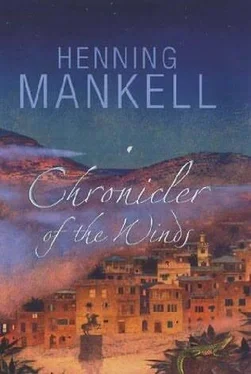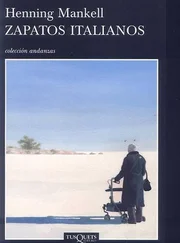At a young age, Dom Joaquim had cast himself into the chaotic arena of local politics. Since the country was governed as a province from across the sea, the locally appointed governors could generally do as they pleased; no one had any opportunity to keep an eye on what they were up to. On those few occasions when suspicion grew too great, government officials would be dispatched from across the sea to find out what was actually going on within the colonial administration. Once Dom Joaquim filled their offices with snakes; another time he installed a number of wild drummers in a neighbouring building, whereupon the government officials either flew into a rage or lapsed into a deep silence and then departed as soon as they could find passage to Europe. Their reports had always been reassuring: all was well in the colony. In recognition of which, Dom Joaquim would stuff little cloth bags of gemstones into their pockets as he bade them farewell at the dock.
Dom Joaquim was first elected municipal governor when he was no more than twenty. His opponent, a kindly and credulous old colonel, withdrew from the race after Dom Joaquim cunningly spread a rumour that the man had been convicted of unspecified crimes in his youth, when he was still living on the other side of the sea. The accusations were false, but the colonel realised that he would never be able to extinguish the rumours and gave up. As in all other elections, fraud was the fundamental organisational assumption, and Dom Joaquim was the winner by a majority that far exceeded the number of registered voters. The principal element of his campaign was a promise, if he were elected, to increase dramatically the number of local holidays, which he implemented immediately after he had been sworn in and appeared for the first time on the steps of the governors residence wearing the plumed tricorn hat, the symbol of his new, democratically achieved eminence.
Dom Joaquim's first act as newly elected governor was to order a large balcony to be built on the façade of the palace from which he could address the citizenry on appropriate occasions. Since he had been legitimately elected, he took pains to ensure that no one could challenge his position as governor, and he was reelected over the next sixty years by an ever growing majority, in spite of the fact that the population decreased drastically during this period. When at last he died, however, he had not been seen in public for a long time. He was so confused by then and had sunk so far into the haze of old age that sometimes he imagined he was dead, and at night he would sleep in a coffin standing next to his wide bed in the governor's palace. But no one had the courage to question the wisdom of his continuing as governor; everyone feared him, and when he did finally die – hanging halfway out of his coffin, as if he had wanted to crawl out to the balcony one last time and look over the city which he had transformed beyond recognition during his long years in power – no one dared do anything until several days later when, in the stifling heat, he began to smell.
He was Dona Esmeralda's father, and she was just like him. When she raced through the city in her open convertible, she would see everywhere the mighty statues crowding the plazas, and every one of them reminded her of her father. Dom Joaquim had always been on the lookout for the least sign of revolutionary discontent and unrest. In his early years he had appointed a body of secret police, a unit which everyone knew about but which officially did not exist. Their only task was to mix with the people and listen for the tiniest hints of unrest. At the same time, Dom Joaquim took quick action whenever a revolution in a neighbouring country threw the current despots into prison, drove them into exile, or put them in front of a firing squad. By then he would have already offered a price for the statues that the enraged populace was toppling to the ground. He paid handsomely for them, and they were transported to the city by ship and by rail. The old inscriptions were filed off, and Dom Joaquim ordered his own family name to be engraved on the statues. Since his ancestors were of simple peasant stock from the Mediterranean plains, he felt no compunction about inventing a new family tree for himself. In this way the city became filled with statues of former generals belonging to his family. Since revolutions in the neighbouring countries were a regular occurrence, the influx of statues became so overwhelming that Dom Joaquim was forced to build new plazas to make room for his purchases. At the time of his death, every conceivable space in the city was taken up with British, German, French and Portuguese monuments to individuals who were now included in the multitude of generals, philosophers and explorers with which Dom Joaquim, in his inexhaustible fancy, had endowed his lineage.
His daughter, the eternally ninety-year-old Esmeralda, would rush past all these memories of Dom Joaquim and his life in her frantic quest for a meaning to her own life. She had been married four times, never for more than a year since she would almost at once grow bored, and the men she had chosen would flee, terrified of her violent temper. She never had any children – although there were rumours that she had a son concealed somewhere who would one day make himself known and get himself elected governor as his grandfathers successor. But no son ever turned up, and Dona Esmeralda's life continued to shift course in her restless search for something that she never seemed able to define.
During this time in the life of the city, which might also be called the era of Dona Esmeralda, colonial war had finally spread to this country too, one of the last on the whole African continent to be so affected. Those young men who had decided to fulfil their inescapable historical destinies and liberate the land from the ever weakening colonial power had crossed the border to the north and entered the neighbouring country, which had already overthrown its past and established its own military bases, its own university. Later, when the time seemed ripe, the men came back over the border, now fully armed with weapons and self-confidence.
The war started on a dark September evening when a local chefe de posto was shot in the thumb by a nineteen-year-old revolutionary, who would later become the first military commander-in-chief of the independent nation. During the first five years of the war, the country on the other side of the sea refused even to acknowledge that it was going on. In the increasingly transparent propaganda, the revolutionary army was labelled as misguided terrorists, deranged criminosos, and the populace was exhorted to grab them vigorously by the ears instead of listening to their malevolent talk about another time and another world in the offing. Gradually, however, the colonial power was forced to acknowledge that the young men were extremely determined and that they quite obviously had the ear of the disloyal public. A colonial army was hastily dispatched; the soldiers began haphazardly bombing the areas where the revolutionary liberators were believed to have their bases, but without fully appreciating it, they suffered one defeat after another. To the very end, those who had come to the country as colonisers refused to accept what was happening. Even when the young revolutionaries surrounded the capital and stood just a few kilometres outside the black townships, the white colonisers continued to administer and to plan for a future that would never be realised.
Only afterwards, when their defeat was a fact and the country had proclaimed its independence, were the long rows of white headstones in the cemeteries discovered. There lay the young boys, often no more than eighteen or nineteen years old, who had come across the sea to take part in a war they never understood, to be killed by enemies they had never even glimpsed. Chaos erupted in the city. Many of the colonisers fled for their lives, leaving behind their homes, their cars, their gardens, their shoes and their black mistresses; trampling over one another in the departure hall at the airport and fighting for passage on the ships about to leave the harbour. Those with sufficient foresight had exchanged their money and possessions for gemstones, now hanging in little cloth bags inside their sweaty shirts. The others left everything behind and departed the country cursing the injustice of the revolutionaries, who had stripped them of all they owned.
Читать дальше












